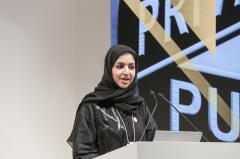UN World Data Forum 2018 Highlights Role Of Data In Driving Digital Economy, Closing The Gender Gap And Implementing The UN’s Sustainable Development Goals 2030
“Sharing is vital,” asserted Her Excellency Ohood Al Shuhail, Director-General of the Ajman Digital Government, as the UN World Data Forum 2018 – organised by the Federal Competitiveness and Statistics Authority (FCSA) – convened at Dubai’s Madinat Jumeirah, highlighting the role of data in driving the digital economy, closing the gender gap, and implementing the UN’s Sustainable Development Goals 2030.
In a dialogued titled “How to Drive Digital Economy through Data”, H.E. Al Suhail noted that most people are still reluctant to share personal information, citing statistics that showed 52% of 107,000 people polled were not open to sharing data even if it would lead to better services.
“There is now a fourth type of literacy – data literacy. This is the ability to read, write and communicate data in context, including an understanding of data sources and constructs, analytical methods and techniques applied, as well as the ability to describe the use-case application and resulting value,” H.E. said, noting that by 2020, some 25% of large organisations will be either sellers or buyers of data via formal online data marketplaces and that the old model of data analytics no longer worked.
H.E. Al Suhail went on to outline the Ajman Government’s roadmap for data, which will oversee all data in the emirate. This includes footfall analysis for decision-making and developing awareness for Ajman government officials.
The session titled “Mind the Gap: Traditional and Non-Traditional Approaches to Closing the Gender Data Gap” brought together Emily Courey Pryor, Executive Director of Data2X; Lauren Pandolfelli, Gender Statistics Specialist in the Division of Data, Research and Policy at UNICEF; María Lily Rodríguez, Nicaraguan Lawyer; Eric Swanson, Co-founder and Director of Research for Open Data Watch; Stefaan G. Verhulst, Co-Founder and Chief Research and Development Officer of the Governance Laboratory @NYU (GovLab); Francesca Grum, Chief of the Social and Gender Statistics Section in the United Nations Statistics Division (UNSD); Dr Zacarias Duarte Castellón, Doctor of Science and specialist in Toxicological and Experimental Pathology, Forensic Medicine and Doctor of Medicine and Surgery; and Jin Hong, Senior Statistician, Deputy Director-General of Department of Social, Science and Technology & Cultural Statistics in the National Bureau of Statistics (NBS) of China.
Speakers at the session explored a range of data and statistics on gender, assessing how they can be used to achieve the most important SDGs, such as empowering women in political, economic and social fields, as well as education and healthcare. The experts went on to highlight a number of humanitarian issues related to women and children, such as sexual harassment, domestic or gender-based violence, and the need to fill the data gap in this regard to enable informed decision-making.
“Gender-based data sheds light on women, in particular, with statistics on breast cancer, gender-based violence, and unpaid labour. We will be channelling our efforts towards filling the data gaps in that regard, especially those pertaining to health, education and security,” said Emily Courey Pryor.
Another session on day one of the Forum explored the progress made in the SDGs 2030, titled “Monitoring the SDGs 3 Years In: How Are We Doing?”, bringing together Leesha Delatie-Budair, Deputy Director General of the Statistical Institute of Jamaica (STATIN); Enrique Ordaz, Director General of Integration, Analysis and Research at INEGI; Robert P. Ndugwa, Officer in charge of the Global Urban Observatory Unit in the Research and Capacity Development Branch at the United Nations Human Settlements Programme (UN-Habitat) in Nairobi, Kenya; Clint Brown, who manages all ESRI product releases; Gatlin Roberts, Chief Statistician at the Statistical Office of Saint Vincent and the Grenadines; Gemma Van Halderen, Director of the Statistics Division in the United Nations Economic and Social Commission for Asia and the Pacific (ESCAP).
Leesha Delatie-Budair pointed out that the 2030 Agenda and Vision 2030 Jamaica have a 91% alignment, “Jamaica is following a partnership approach to achieving 2030, bringing together the whole of the government and the whole of society,” she said, revealing that the Jamaican Government is efficiently monitoring the National Statistical System (NSS) to deliver data towards the attainment of SDG’s. The Authorities in the Caribbean island are following a multi-stage process, consisting of assessment, data collection, and reporting using surveys, pilot projects, etc., following traditional and non-traditional sources.
The second UN World Data Forum – set to be held for three days on October 22-24, 2018 – will welcome more than 1,500 data experts, policy-makers, and representatives from academia, private companies and civil society organisations (CSOs) from around the world. The event follows the inaugural Forum, which took place in 2017 in Cape Town, South Africa.








